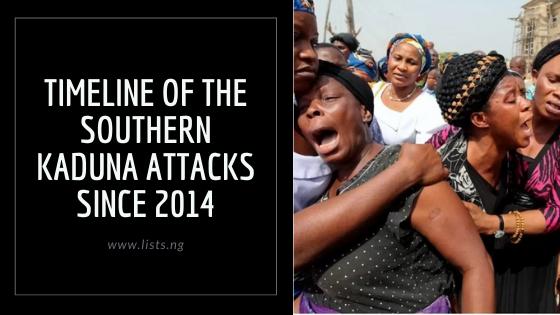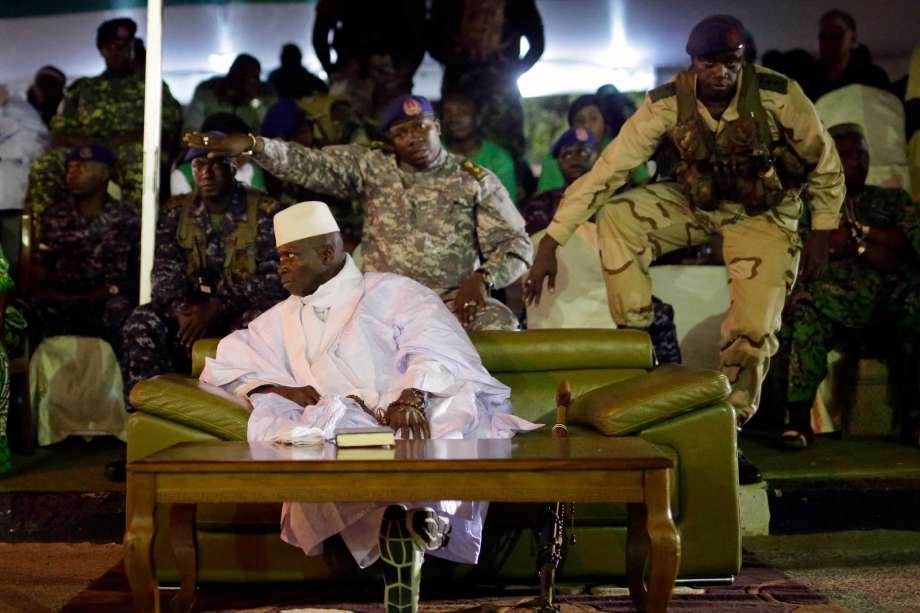For about 20 years, Kaduna State has experienced a rapid split along religious and ethnic lines. Northern Kaduna is widely populated by the Muslim Hausa-Fulani while the south is more diverse, with Christianity the predominant religion. This split has resulted in widespread violence, and this has taken a greater dimension since 2014. Thousands of people have been either killed or displaced and countless homes have been described.
The majority of these attacks have been carried out by the northern Hausa-Fulani against the christian populated south. Despite the devastation caused by these attacks, it seems like the Kaduna state government and the security personnel are unable to put an end to it, hence the continuous recurrence.
For the sake of history, below is a timeline of major attacks since 2014.
March 2014 – At least 100 villagers were killed across four communities of Manchok in Kaura local government. The attacks linked to disputes between ethnic groups.
January 2015 – On January 2, unidentified gunmen attacked and killed Yohanna David Shinkut, the District Head of Zangang Atakar Chiefdom of Kaura local government area of the state. Less than 3 weeks later on January 27, a funeral ceremony in another southern community in Kamanton Chiefdom of Kafanchan local government, were attacked and seven people were killed.
October 2016 – On 16 October, gunmen believed to be Fulani herdsmen attacked Godogodo village in Jama’a Local Government Area. The gunmen were said to have attacked a military checkpoint in the area before invading the village. Over 40 people were killed in this deadly attack
November 2016 – A spate of attacks on Christian dominated Kauru Local Government Area, leaving 45 dead and 120 houses, including eight house-churches burned down.
December 2016 – Gunmen struck in Goskan Village, Kafanchan, in Jema’ah Local Government Area of Kaduna State, a day before christmas eve, killing about five persons, mostly women. Parts of Goska, about five kilometres away from Kafanchan were razed.
February 2017 – Hundreds of militiamen descended on Bakin Kogi in the Kaninkon Chiefdom of Jema’a Local Government Area (LGA) in southern Kaduna during the evening of 19 February, burning down houses, killing at least seven people and leaving scores more injured.
In the early hours of 20 February, Fulani gunmen killed 14 people during simultaneous attacks on the villages of Mifi and Ashim in Kaura LGA in the Attakad Chiefdom. Victims included women and children, and were aged between eight and 73.
February 2018 – On Sunday 11 February, gunmen suspected to be herdsmen, attacked Bakin Kogi, a village in Jama’a local government area of the state, killing four people.
March 2018 – On March 28, at least six persons were feared killed in attacks on Bakin Kogi and Kaninkon chiefdom in Jama’a local government area of Kaduna State. The two attacks occurred at about 10:00 a.m. and 11:00 a.m. respectively and were carried out by gunmen suspected to be herdsmen.
February 2019 – On February 9, six people were killed in attacks in the Ungwan Barde area. The following day, 10 people including a pregnant woman were killed in that area. On 26 February, 38 people were killed and around 40 homes were destroyed in attacks on the Karamai community in Maro, Kajuru.
March 2019 – 10 March, Ungwan Barde village in Kajuru suffered an attack in which 17 people died and dozens of homes were burnt. On 11 March, 52 people were killed and around 100 homes were destroyed in attacks on Inkirimi and Dogonnoma villages in Maro, Kajuru Local Government Area. Victims included women and children.
January 2020 – On January 8, Michael Nnadi, 18, along with Pius Kanwai, 19, Peter Umenukor, 23, and Stephen Amos, 23, were abducted by men dressed in military regalia one. It was eventually announced on February 1 that Nnadi was killed by his abductors.
On that same day, the body of the wife of medical practitioner Dr Philip Ataga, who had been abducted for ransom from her home in Juji, Chikun Local Government Area during the early hours of 25 January along with two of her three children, was found in the bush along the Abuja-Kaduna Highway.
March 2020 – Nine people were killed and 30 homes destroyed on 16 March in an attack by Fulani militia in southern Kaduna. The attack at around 4:00am and victims included women and children.
May 2020 – 13 May, five people were killed and one was injured as armed men of attacked Makyali village in Kajuru Local Government Area, Kaduna state. Once again, on May 25, armed Fulani herdsmen attacked and killed at least five villagers, displacing others within seven communities situated in the Southern Kaduna axis of Kaduna State.



